After Visiting Friends: A Son's Story
by Michael Hainey
Michael Hainey's life was forever changed the morning of April 24, 1970. As he and his older brother came down for breakfast, they found their family gathered in the kitchen--except for their father. "Your dad is dead," their mother tells them. In the shock of the moment, Hainey recalls, "I think only one thing: how excited I am." Seeing his brother in tears for the first time in his life, the six-year-old boy gleefully exclaims, "Crybaby! Crybaby!"
The title of After Visiting Friends refers to the public explanation for 35-year-old Robert Hainey's death in the middle of the night, in a neighborhood miles from his office at the Chicago Sun-Times, where he worked the late shift as assistant copy desk chief. "He died and we never spoke again about him," Hainey writes; any time he tried to ask his mother about what happened, he was briskly rebuffed. He didn't even know where his father's body had been found until he was 18, and decided to look up the obituaries while researching a school project at the library. That's when he discovered that three different newspapers had three different accounts of how and where his father died. But he sat on his questions for more than a decade and a half--until he himself turned 35. "I cracked," he says, convinced that he was doomed to die young like his father. "My doctor called it a functioning breakdown." Eventually, to come out the other side, he would need to find the truth.
Hainey's recollection of a childhood defined by his father's absence is haunting, although there are a few flashes of dark humor, as when he invokes the awkwardness of having to explain his situation over and over to his teachers:
"Mi padre está... ¿dead?"
"No, Miguelito. No se dice dead. Se dice tu padre está muerto. Mwer-toe!"
Hainey finds an apt metaphor for his mother's refusal to talk about her dead husband in the Soviet practice of airbrushing disgraced political figures out of official photographs. "I learned never to mention the name of the nonperson," he says. "I worked to crush my desire to know him and smother my instinct to keep him alive."
When he starts poking into the matter as an adult, however, Hainey learns his mother isn't the only one who doesn't want to talk about it. His cousin is willing to point him in the right direction--"I always knew this day was going to come"--but he only knows so much, and as Hainey begins tracking down his father's former colleagues to fill in the gaps, they maintain a rigid wall of silence. "Don't call me again," one says; "I don't know anything about that night," another insists. And one goes so far as to tell him straight up, "I don't think you have the right to know the truth." Fortunately, he comes across more sympathetic figures at crucial moments, from the Chicago morgue employee who insists "God wants you to tell that story" to the one coworker of his father whose own family history makes him willing to talk: "I know what it's like to be searching for the truth and all you get is silence."
Hainey's journalistic zeal in nailing down the story is only part of what After Visiting Friends is about, though. It's also a book about repairing his relationship with his older brother (who, of course, doesn't remember that childhood taunt) and trying to get his mother to finally open up--and, while all this is going on, coping with the final decline of his 95-year-old grandmother's health. Then there's the question of what he should do with the knowledge he's worked so hard to uncover: "It's one thing to be the truth-seeker," he confesses. "It's quite another to be the truth-bearer."
We all have unanswered questions about our family's past, although they aren't always as stark as the ones Michael Hainey faced--and few of us are likely to take on the role of investigative journalist so thoroughly to find our answers. Hainey's candor in After Visiting Friends, especially about the self-doubt and frustration that accompany his quest, makes it easy for us to root for him--not just in the search for truth but in the emotional transformation that comes with it. --Ron Hogan, founder of Beatrice.com



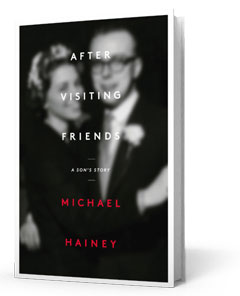
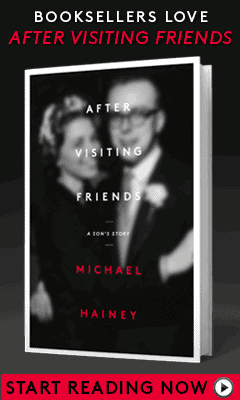
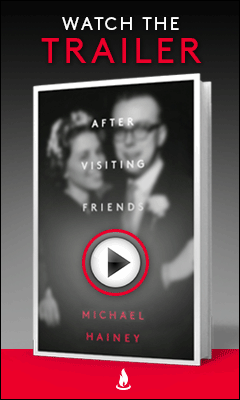
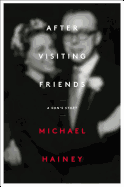

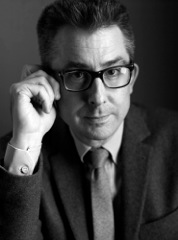
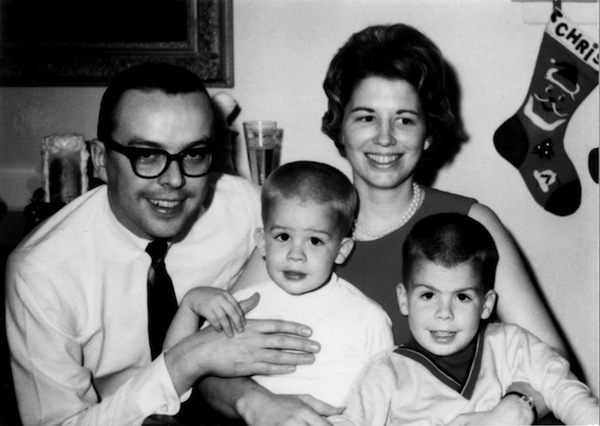 Hainey estimates that he spent five or six years on the initial reporting--interviewing his father's former colleagues, tracking down his medical records, and so on. "I didn't have a book contract or anything, I was just going to write this story for myself," he recalls. "I didn't know what it was going to be, I had no promise it would sell." Though many of the people he spoke to tried to keep him from the truth, he says he bears them no ill will: "I love every person who comes on stage in this book, and I've worked to honor every one who comes in, because I feel that even if someone was stonewalling me, I believe they were doing it out of the best of intentions."
Hainey estimates that he spent five or six years on the initial reporting--interviewing his father's former colleagues, tracking down his medical records, and so on. "I didn't have a book contract or anything, I was just going to write this story for myself," he recalls. "I didn't know what it was going to be, I had no promise it would sell." Though many of the people he spoke to tried to keep him from the truth, he says he bears them no ill will: "I love every person who comes on stage in this book, and I've worked to honor every one who comes in, because I feel that even if someone was stonewalling me, I believe they were doing it out of the best of intentions."